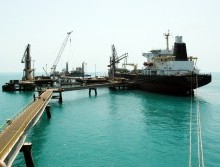
Oil sea shipping is one reason we’re worried about Egypt. Oil Tanker. Illustrative. Photo Courtesy of U.S. Navy. Photo by Mass Communication 2nd Class Nathan Schaeffer
Tragic clashes in Egypt have returned and dozens more have died in violence between supporters of the former Islamist president and security forces backing the current government, according to Ahram Online. That’s bad enough news, but it gets worse: There’s been a resurgence in militant attacks on Egyptian authorities that could eventually target the world’s oil trade.
Egypt, you may recall, controls the Suez Canal—a vital shipping route for oil tankers. They are basically the gatekeepers for a nice amount of the global oil trade. A shutdown of the Suez, or even the threat of one, could lead to surging gas prices. And the risk of that happening is growing.
One day after 53 people were killed in political violence in Egypt, Ahram Online reported that gunmen killed five Egyptian soldiers on patrol near the city that houses the Suez Canal. Ahram further reported that there have been other recent attacks in the Suez region.
And Monday’s gunmen attack was just one of three that morning. A car bomb targeted a security headquarters in the terrorist-filled Sinai region and Sky News Arabia reported that a rocket-propelled grenade attack was leveled at a TV satellite facility in the capital city of Cairo.
In short, the violence is expanding its reach and intensity.
Things have been tense in Egypt following the military coup that overthrew the former Muslim government. Millions had protested the leadership of former-President Mohammed Morsi and the army stepped in to remove him from power. Massive clashes between supporters of Morsi and security forces ensued, and many of the protesters were killed. Terrorists in the Sinai region also stepped up attacks on the military.
While there has been a general calm in most places—besides the Sinai region—the latest violence renews fears of a civil war that could seriously damage the world’s oil supply. Such a conflict would be a deadly tragedy for Egypt and an economic crisis for the world.
(By Joshua Spurlock, www.themideastupdate.com, October 7, 2013)
